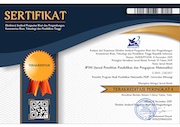Analisis subject matter knowledge calon guru matematika pada topik geometri
Abstract
This study aimed to analyse Subject Matter Knowledge (SMK) of preservice teachers in mathematics teaching on the topic of geometry at Mathematics Department of Siliwangi University. The researcher investigated teachers’ subject matter as the main knowledge that is needed by preservice teachers in teaching, and the other aspects might be required for developing classroom instruction to be more effective. This study was purposed to know subject matter knowledge of preservice teachers. The research used survey method at 150 participants in the fifth semester who will join the program of teaching training in the next semester. The data were collected by questioners, mathematics test, and deep interview. The subject matter knowledge was measured by four components which were constructed by the researcher from Ball&Grossmans’ Framework to be suited to the necessary of preservice teachers. The results showed that preservice teachers have subject matter knowledge as: (1) the average of mathematical terminology understanding was in level of 63%, (2) the average of knowing the truth of mathematical sentences was in level of 60%, (3) the average of mathematical misconception knowledge was in level of 68%, (4) the average of problem-solving skill was in level of 84%. Preservice teachers, generally, have a good enough level of subject content knowledge with the average level of 69% of all maximum scores of the instruments tested. Preservice teachers’ subject matter knowledge was identified influenced by pedagogical disposition. Based on the statistical calculation, there was the positive correlation between preservice teachers’ subject matter knowledge and pedagogical disposition of r = 0.78. It was known that prospective teachers more often work with problems solving than with understanding the concepts in depth. It was also acknowledged that solving the problem has become a learning orientation and the emphasising of the concepts and misconceptions were rarely studied in depth in teaching and learning process.
Full Text:
view PDFReferences
An, S., Kulm, G., & Wu, Z. (2004). The Pedagogical Content Knowledge of Middle School: Mathematics Teachers in China and The U.S., Journal of Mathematics Teachers Education. Vol 7, 145-172
Arikunto, suharsini. (1998). Prosedur Penelitian Suatu Pendekatan Praktik. Jakarta: PT Grafindo Perdasa
Ball, Deborah Loewenberg. (1990). Research On Teaching Mathematics: Making Subject Matter Knowledge Part Of The Equation. Advances in research on teaching: Vol. 2. Teachers’ subject matter knowledge and classroom instruction. Greenwich, CT: JAI Press.
Ball, D. L., & Mc. Diarmid, G.W. (1990). Handbook for Research on Teacher Education: The Subject Matter Preparation of Teacher. New York: MaccMillan
Ball, D. L., Thames, M.H., & Phelp, G. (2008). Content Knowledge for Teaching: What Makes It Special?. Journal of Teacher Education. 59, (5), 389 – 407
Buchmann, M. (1984). The priority of knowledge and understanding in teaching. In J. Raths and L. Katz (Eds.), Advances in teacher education (Vol. 1, pp. 29-48). Norwood, NJ: Ablex.
Gudmundsdottir, S. (1987). Pedagogical Content Knowledge: Teachers’ Ways of Knowing. Paper presenter at the annual meeting of the American Educational Research Association. New Orleans.
Grossman, P. (1990). A tale of two Hamlets. In The making of a teacher: Teacher knowledge and teacher education (pp. 1-18). New York, NY: Teachers College Press.
Hicks, S.J. (2010). A Study of Teacher Knowledge as Secondary Mathematics Teachers Use a New Technology. Dissertation. University of Missouri.
Kilic, H. (2009). Pedagogical Content Knowledge of Preservice Secondary Teacher. Dissertation. University of Georgia.
Letitia, Mary & Dick. (2003). Nurturing Five Disposition of Effective Teacher. The 2nd National Symposium on Educator Disposition. Eastern Kentucky University.
Li, Y., & Smith D. (2007). Prospective Middle School Teacher’ Knowledge In Mathematics and Pedagogy For Teaching – The Case of Fraction. Proceedings of 31st Conference of The International Group for The Psychology of Mathematics Education, Vol.3, pp. 185-192. Seoul: PME
Ma, L. (1999). Knowing and teaching elementary mathematics: Teachers’ understanding of fundamental mathematics in China and the United States. Mahwah, NJ: Erlbaum.
Mahmudi, A. (2009). Mengembangkan Kemampuan Berpikir Siswa Melalui Pembelajaran Matematika Realistik. Makalah disampaikan pada Seminar Nasional Penelitian, Pendidikan dan Penerapan MIPA. FMIPA UNY, Yogyakarta 16 Mei 2009.
RAND Mathematics Study Panel (2003). Mathematical proficiency for all students: Towards a strategic development program in mathematics education. Santa Monica, CA: RAND Corporation MR-1643.0-OERI.
Shulman, L.S. (1995). Those who understand: knowledge growth in teaching in: B. Moon & A.S. Mayes (Eds) Teaching and Learning in the Secondary School (London: Routledge).
Shulman, L. S. & Sykes, G. (1986). A National Board for Teaching? In Search of a Bold Standard: A Report for the Task Force on Teaching as a Profession. New York: Carnegie Corporation, p. 6.
Shulman, L. S. (1987). Knowledge and Teaching: Foundations of the New Reform. Harvard Educational Review. 57(1), 1-22.
Sumarmo, U. (2006). Pembelajaran Keterampilan Membaca Matematika pada Siswa Sekolah Menengah. [Online]. Tersedia: http://math.sps.upi.edu/wp-content/uploads/ 2010/02/MKLH-KETBACA-MAT-NOV-06-new.pdf [12 Juni 2015]
DOI: https://doi.org/10.37058/jp3m.v2i2.169
Refbacks
- There are currently no refbacks.
©2017 JP3M (Jurnal Penelitian Pendidikan dan Pengajaran Matematika)
Program Studi Pendidikan Matematika
Fakultas Keguruan dan Ilmu PendidikanÂ
Universitas Siliwangi
Jl. Siliwangi No. 24 Kota Tasikmalaya - 46115
email: jp3m@unsil.ac.id
e-ISSN: 2581-2807 ; p-ISSN: 2460-8599

This work is licensed under a Creative Commons Attribution-NonCommercial-ShareAlike 4.0 International License.
StatCounter:
Detail


